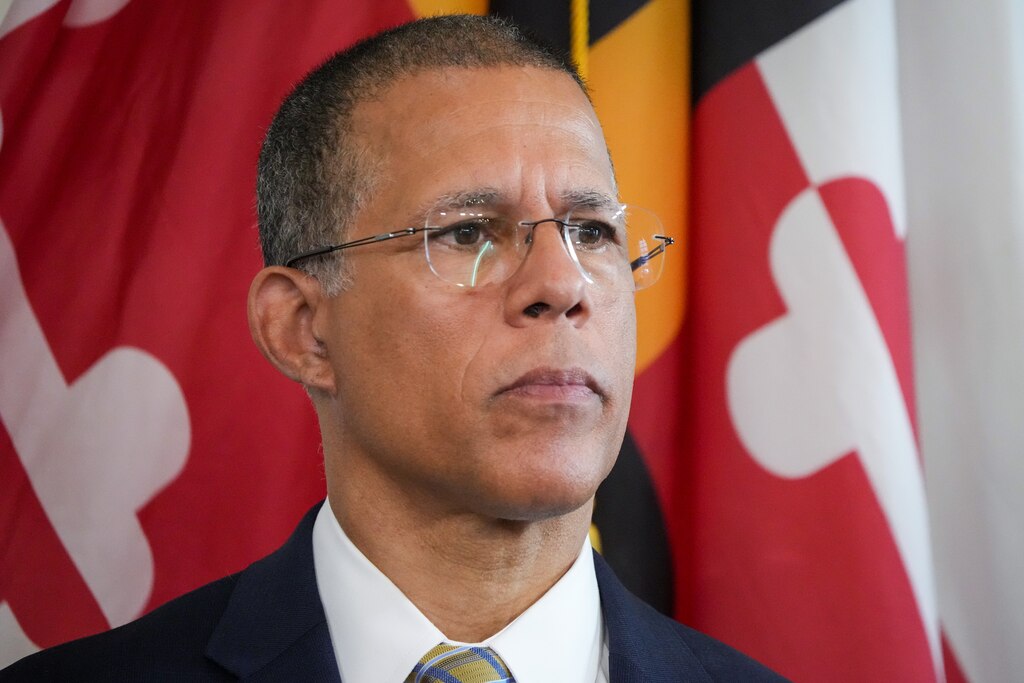CURRENT EDITION: baltimore (none)🔄 Loading BlueConic...EDITION HISTORY: No changes tracked
🔵 BlueConic: ___🔗 Query: ___✏️ Composer: ___
State elections board: Members may not communicate with people suing the board
The decision comes after a revelations that Republican board members had been corresponding for months with an election activist attempting to use the courts to stop Maryland’s election.
U.S. Senate poll tracker: Alsobrooks lead over Hogan steady in Washington Post poll
Angela Alsobrooks leads Larry Hogan, 54% to 40%, in a poll from Emerson College as in-person voting approaches.
GOP election board members emailed activist who is trying to stop election, records show
The dozens of pages of email threads also included speculative voter fraud scenarios discussed between state Republican Party leaders and a GOP election board member.
Maryland law closes a loophole in abortion care, attorney general says
Maryland is trying to eliminate an obscure rule that stopped Medicaid from paying for certain patients’ abortions.
A vicious attack, a viral video and a community asking what went wrong
The incident has triggered the latest discussion of the state’s youth legal system, a seemingly perpetual cycle of frustration and finger pointing.
State’s attorney charges teen as an adult in Butchers Hill attack that went viral
Police also arrested an 18-year-old on charges of attempted murder in the Butchers Hill attack.
Maryland is a safe haven for abortion care — with one obscure exception
Women who qualified for Medicaid because they are pregnant may have to foot the bill for an abortion.
Light rail collides with vehicle Friday night; incident under investigation
The northbound train packed with Orioles fans celebrating a 7-1 win over the Detroit Tigers crashed into a motorist at Woodberry and Coldspring, wedging the vehicle between the train and a fence.
King of Jordan meets Gov. Wes Moore in rare visit by head of state
The two leaders shared brief remarks ahead of a roundtable discussion with business and university leaders, expressing mutual admiration and a broad desire to find “synergies” between Jordan and Maryland.
King of Jordan to visit Gov. Moore in Annapolis Wednesday
The king’s visit comes as the Middle East region is embroiled in conflict as Israel fights Hamas in Gaza and Hezbollah in Lebanon.
State Key Bridge lawsuit likely, with announcement planned Tuesday
Neither the governor nor attorney general offered details on their announcement, but it comes just before a deadline to file legal claims against the ship's owner and operator.
Maryland election officials confident post office is reliable for mail ballots
Maryland has one of the most generous timetables in the nation — and that means that there’s little chance that a mail-in ballot won’t arrive by the cutoff.
Maryland Democrats say candidate Hogan’s words on Trump don’t match his record
Former Attorney General Brian Frosh says former Gov. Larry Hogan did not support lawsuits challenging the Trump administration.
Moore says he has no time for Bronze Star ‘foolishness’ at Texas journalism event
Gov. Wes Moore sat down with NPR for an hour-plus interview Friday at the Texas Tribune Festival, the nonprofit news outlet’s annual fundraiser.
Poll: Parrott cracks a narrow lead in race for Congress in Maryland’s 6th District
A former Republican state delegate has a wafer-thin lead in the 6th District race for Congress, although he trails in the most densely populated portions of the district, a poll out Thursday shows.
Nobody likes taxes. At least Maryland will let some file online for free.
More than 700,000 Marylanders should be able to file their income state and federal tax returns online for free next year, saving hours of work and hundreds of dollars for tax software and prep services.
Military veterans skeptical of Moore’s inaccurate Bronze Star claim
“People need to be careful around how you portray your service and don’t embellish things,” one veteran said of the inaccuracies of Gov. Wes Moore’s Bronze Star claim.
Moore’s approval rating soars in new poll of likely voters
Maryland Gov. Wes Moore's approval rating is up six points since February.
Maryland’s cannabis agency director will step down in December
Will Tilburg has shaped the state’s medical and recreational cannabis rules, educated lawmakers on national best practices and established several first-in-the-nation cannabis policies and standards during his nearly seven-year tenure.
Moore turns Maryland experience into case for Democratic ticket in DNC speech
In his nearly eight minute spot Moore wrapped an earnest story about the Francis Scott Key Bridge collapse and some familiar — for Marylanders — arguments about service, patriotism and perseverance into his defense of a Harris-Walz administration.














